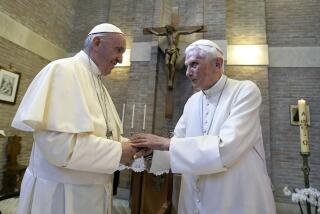20 Million Copies Later, Vatican Says Don’t Read ‘Da Vinci Code’
- Share via
ROME — OK, so maybe author Dan Brown takes a few liberties.
Jesus wasn’t divine, after all; he married Mary Magdalene, a woman of possible ill repute, and they had kids. What’s the fuss?
This now-famous premise shaping Brown’s bestseller “The Da Vinci Code” has infuriated leaders of the Roman Catholic Church and led to demands from a senior Vatican official that the book be shunned.
“My appeal is as follows,” Cardinal Tarcisio Bertone said this week during a Vatican Radio broadcast. “Don’t read and don’t buy ‘The Da Vinci Code.’ ”
Bertone said the breathless thriller of madcap chases through the Louvre, code-crunching and sinister intrigue in Rome is a pack of lies that maligns the world’s greatest historical figure -- Jesus Christ -- and attempts to undermine Catholicism.
Although the book, and especially its suggestions about Jesus and Mary Magdalene, have always been controversial for church officials, Bertone, the archbishop of Genoa, is the highest-level prelate to come out against Brown’s blockbuster.
Bertone, a former secretary of the powerful Vatican department that enforces church doctrine, sponsored a symposium Wednesday night in Genoa to, as he put it, expose the myths and malice of the book.
Speaking at the conference, Bertone acknowledged that the book was a brilliantly marketed page-turner but said it “falsifies the figure of Christ and the events central to the Christian experience, namely the passion of Christ, his death and resurrection.”
The timing of Bertone’s comments, coming nearly two years after the book started flying out of stores everywhere, had a few people scratching their heads. The book has been translated into 44 languages and sold an estimated 20 million copies.
The condemnation might have been prompted by the fact that the book’s plots and assertions are about to become even more widely disseminated in a movie starring Tom Hanks. Or it could be the growing popularity of “Da Vinci Code”-based tours to Rome and Paris in which tourists, with book in hand, try to follow its clues.
Some priests have said they are alarmed that people really believe some of the book’s wilder conspiracy theories.
The novel’s vogue has contributed to the belief among many church leaders that their faith is under attack. Religious intolerance that has grown since the Sept. 11, 2001, attacks in the United States and the U.S. invasion of Iraq has especially persecuted Christians, the Rome-based Jesuit magazine, Civilta Cattolica, said this month. The publication often reflects Vatican thinking.
A number of senior church officials in recent weeks have denounced what they call Christianophobia. They are alarmed at what they see as the eradication of Christian values amid a rise in secularism and anti-Catholic policies, such as the legalization of abortion and gay marriage, in traditional Christian strongholds such as Western Europe and the United States.
Bertone said Brown’s thriller was part of that trend.
“What would have happened if a book like this had been written, full of lies, on the Buddha or Muhammad or even, for example, if a novel had been published that manipulated the history of the Holocaust?” he asked.
The publisher, Doubleday, defended the book as a work of fiction. Reuters news service quoted Brown’s agent as saying the author was not expected to respond to Bertone’s complaints, though he previously has said that he welcomed debate.
Bertone was joined at the Genoa conference by Massimo Introvigne, director of the Center for Studies on New Religions, based in Turin, Italy. He said the danger within Brown’s book was that he stated early on that his descriptions of secret rituals and mysterious documents were factual.
The book’s popularity, Introvigne said, stems from its combination of “two types of social ‘tastes’ which appear to be quite widespread: on the one hand, the notion of ‘conspiracies’ and secret societies that dominate the world; and on the other hand, an increasingly unashamed and virulent anti-Catholicism.”
Bertone, Introvigne and others also took exception to Brown’s use of Opus Dei, a controversial lay order that is well-connected in the Vatican, as the villainous foil.
In the book, an Opus Dei “monk” is a killer; critics point out that Opus Dei does not have monks and has risen in power and respectability, with the pope elevating its Spanish founder to sainthood in near-record time two years ago.
Msgr. Javier Echevarria, an Opus Dei bishop, on Wednesday called on Brown to “rectify” his descriptions of the secretive order.
“He knows that he is doing wrong and that he is deceiving the people,” Echevarria said, adding that he is praying “every day” for the author.
More to Read
Sign up for our Book Club newsletter
Get the latest news, events and more from the Los Angeles Times Book Club, and help us get L.A. reading and talking.
You may occasionally receive promotional content from the Los Angeles Times.











